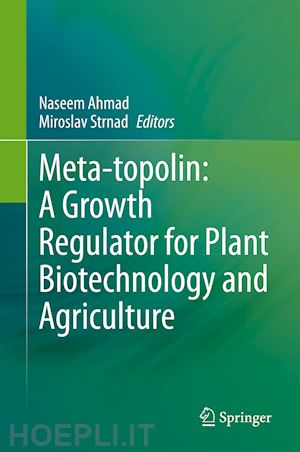
Questo prodotto usufruisce delle SPEDIZIONI GRATIS
selezionando l'opzione Corriere Veloce in fase di ordine.
Pagabile anche con Carta della cultura giovani e del merito, 18App Bonus Cultura e Carta del Docente
Plant tissue culture (PTC) technology has gained unassailable success for its various commercial and research applications in plant sciences. Plant growth regulators (PGRs) are an essential part of any plant tissue culture intervention for propagation or modification of plants. A wide range of PGRs are available, including aromatic compounds that show cytokinin activities, promote cell division and micro-propagation, viz. kinetin, N6-benzyladenine and topolins. Topolins are naturally occurring aromatic compounds that have gained popularity as an effective alternative for other frequently used cytokinins in in vitro culture of plants. Among them, meta-topolin [6-(3-hydroxybenzlyamino) purine] is the most popular and its use in plant tissue culture has amplified swiftly. During the last few decades, there have been numerous reports highlighting the effectiveness of meta-topolin in micropropagation and alleviation of various physiological disorders, rooting and acclimatization of tissue culture raised plants.
Dr. Naseem Ahmad is working as Assistant Professor in the D/o Botany, Aligarh Muslim University, Aligarh. He has also worked as a Young Scientist and has more than 10 years of experience in Plant Tissue Culture and Molecular Biology. Published about 44 research papers, 02 edited Books entitled “Plant Tissue Culture:Propagation, Conservation and Crop Improvement” (Springer;2016); Thidiazuron: From Urea Derivative to Plant Growth Regulator (Springer, 2018). He holds Life Membership of many Learned/ Scientific Societies and is a fellow of Indian Botanical Society (FBS). He is recipient of “Yuva Vaigiyanik Samman (2009), CST, UP; Young Scientist (2010) by NESA, N. Delhi, Rashtriya Gaurav Award (2015) by IIFS, N. Delhi, Young Scientist (2015) by IFEE, Kolkata and Prof. Hira Lal Chakravarty Award (2019) by ISCA, Kolkata (India). He was also a Senior Research Fellow (SRF) of CSIR, N. Delhi.











Il sito utilizza cookie ed altri strumenti di tracciamento che raccolgono informazioni dal dispositivo dell’utente. Oltre ai cookie tecnici ed analitici aggregati, strettamente necessari per il funzionamento di questo sito web, previo consenso dell’utente possono essere installati cookie di profilazione e marketing e cookie dei social media. Cliccando su “Accetto tutti i cookie” saranno attivate tutte le categorie di cookie. Per accettare solo deterninate categorie di cookie, cliccare invece su “Impostazioni cookie”. Chiudendo il banner o continuando a navigare saranno installati solo cookie tecnici. Per maggiori dettagli, consultare la Cookie Policy.